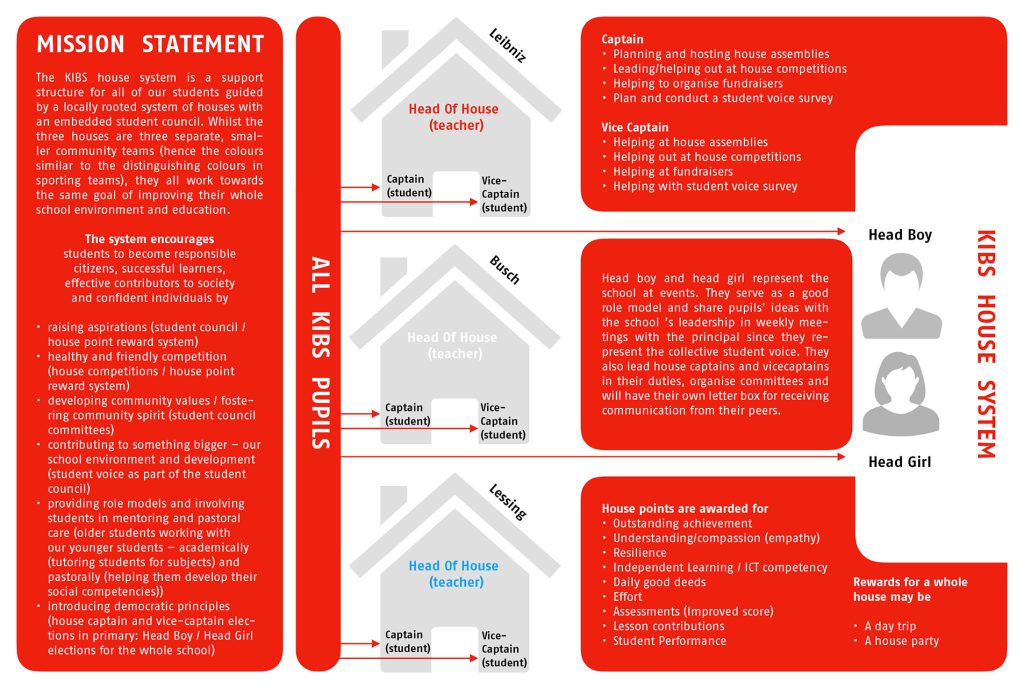We consider social-emotional learning as equal to academic learning. Thus, in addition to learning successes, we also promote various skills and abilities such as empathy, independent learning, good deeds, constant effort and other achievements (peer support, courage, commitment to others). Another part of this guidance system is building relationships between students of different age groups to strengthen the sense of community. Our students move from dependency to independence in many ways – they engage intensively in school life and take on responsibility from an early age.
Participation in the Kindergarten
“Children have the right to be involved in all decisions that affect them according to their level of development. At the same time, it is a right not to participate. This voluntariness on the part of children to exercise their right is matched by the obligation of adults to involve children, to awaken their interest in participation.”
(Article 12 of the UN Convention on the Rights of the Child)
We have developed our own process of participation with the children that we reflect on regularly. The children are involved in decisions through situational work. They are given the opportunity to make decisions on their own or with the support of the educators, depending on the situation. The children are enabled to freely express their opinion and criticism. They are listened to and new ideas for changes are collected together.
House system
At KIBS we have a House System. The House System supports the academic developments of the students by seeing social-emotional learning as equally important. This has a positive effect on self-confidence and makes students feel that all talents are valued. By being anchored with our student council, all students have the opportunity to democratically help shape and further shape their school.
Each child is assigned to one of the three houses – Leibniz, Lessing or Busch. They are individually awarded house points for such things as excellence,
demonstrating compassion (empathy), demonstrating independent learning, good deeds, consistent effort, academic achievement and other student achievements (peer support, courage, service to others). When students achieve 30,60,100,150 or 200 house points, they are recognised with certificates and awards at the school assembly. This is our way of highlighting positive actions, as we believe that positive experiences continue to strengthen the joy of learning and that children can succeed not only academically but in many ways.
Another part of this academic support system is building relationships between students of different ages to strengthen the sense of community. Our students are moving from dependence to independence in many ways. They are deeply involved in school life and take on responsibilities from an early age.
The student council, which is linked to our House System, ensures cooperation at various levels. Our pupils take on different roles after democratic election processes. Starting in Primary as House Captains and Vice-House Captains and class representatives. These students meet regularly with their Heads of House to develop ideas on how to make our school better.
Here is a diagram showing our House System:

Student Leadership
It is important to us that our children learn from an early age to take responsibility, to weigh up and make decisions, and to stand up for others. In the kindergarten, all children are involved in the participation concept according to their age. At school, our classes elect class representatives for their respective classes every year.
In addition, the pupils in the primary school elect their House Captains and in the grammar school the Presidents of the Houses. In the primary school, our pupils also have the opportunity to apply to become an iHero (pupils who help others to implement technology and take various further training courses). Not only does this exemplify the basic democratic principles, but it also helps our elected representatives to take responsibility and accept other opinions.
You can find out more about our elected student representatives here
Mentoring
Our primary students are strategically supported and academic, emotional and social needs are addressed in detail by teachers. Individual mentoring sessions with class teachers, four times per school year, result in specific targets over which the children also have control over, thus actively guiding their own schooling from the very beginning. We want to make sure that all of the students’ talents are recognised as equal, thus building and strengthening self-confidence on an emotional basis at the same time as academic skills.
Special features of our primary
Mental Health and Wellbeing
Our world, expectations and current events can be stressful for everyone, even children are not unaffected. Our educators and teachers always have an open ear for concerns and fears. The exchange through open conversation offers an additional level of support for the children’s development. In the primary school, we also have a calendar with monthly changing topics for our teachers and students on mental health. Together we talk about different relaxation techniques, do yoga or meditate and talk about the monthly focus in joint projects.
You can find out more about these topics in our Mental Health Calendar